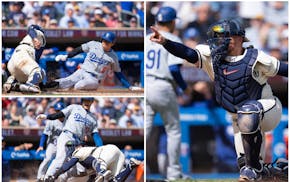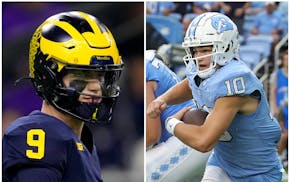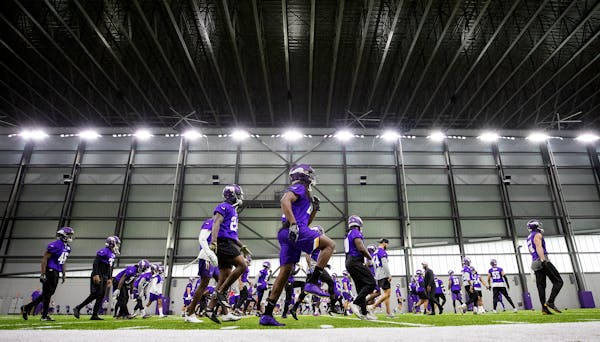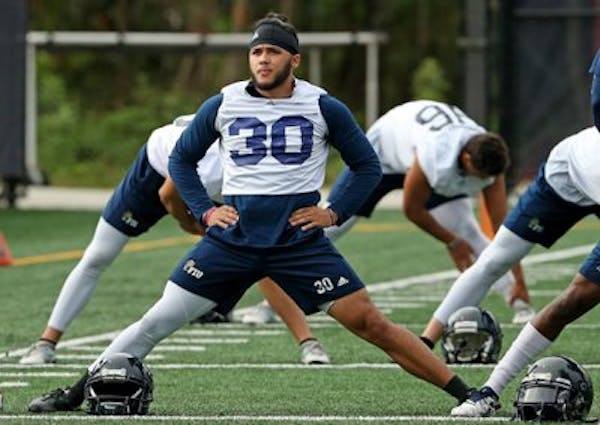NFL players are skipping in-person offseason workouts. Not every player, but a large percentage have told teams they intend to put the "voluntary" into voluntary workouts. They are not showing up.
Good for them. That was my initial reaction. Good for Vikings players and their brethren on other teams who are saying no thanks to returning to their workplace for a handful of spring workouts conducted in shorts and, by rule, cannot include live contact.
Are those workouts really that essential to a team's ability to win a Super Bowl? Couldn't they get all the preparation needed during training camp, which seems to drag on forever anyway?
Yes, OTAs are important for rookies and young players. Extra reps can be valuable. But veterans? Seems unnecessary.
Players already put their bodies through enough stress and strain, and now the league is adding a 17th game to the schedule starting this season.
A virtual offseason in which Zoom meetings replaced on-field workouts worked just fine last season. The NFL did not implode to ashes. Players still somehow managed to learn plays and schemes and run them effectively during games without OTAs.
There were exciting games and games that were stinkers, but that was no different from any other season. Nothing really changed.
If afforded the support of solidarity, I assumed most players, if not all, would give a hearty thumbs-down to OTAs.
Then I sent out texts Wednesday morning to two dozen former NFL players, asking one question: On a scale of 1 to 10, how important did you feel that in-person, on-the-field offseason workouts were for you to be personally prepared for the season — 1 being unnecessary and 10 being critical.
Fourteen responded. Their answers surprised me.
One player replied "11." Only one gave it a "1."
Here were the others: 8, 9, 9, 8, 10, 7.5, 10, 10, 5, 2.
Two players couched their answers identically: They put the importance at 10 early in their careers, 3 as a veteran.
One player described the question as "tricky." The actual training could have been accomplished from home, but he found the team bonding component and being able to fine-tune specific details on the field to be vital. That is why he gave it a 5.
The high scores — the 10s and 9s and 8s — were illuminating. I would not have predicted that. I expected most would be on the other end, but their careers also didn't overlap a global pandemic when showing up for OTAs was not an option. They only know what they know.
Current NFLPA President JC Tretter of the Cleveland Browns made the case for permanent virtual offseason last December in a letter posted on the union website.
Tretter wrote: "We are the only major sports league with an offseason program. The most physically demanding sport is the only league that brings their players back for extra practices outside of the season. The argument in favor of these offseason practices is based on the assumption that players need reps during OTAs to develop and learn while teams need the practices to gel. Yet, the lack of OTAs this year demonstrated that those theories aren't substantiated."
Players cite a decrease in injuries during the 2020 season after the pandemic eliminated offseason workouts as supporting evidence for why in-person OTAs are not essential and potentially dangerous to their health.
Coaches crave structure and in-person contact and instruction, but players have data on their side at a time when the league professes to being sensitive to their employees' well-being.
Skipping OTAs is usually frowned upon, at least in perception. If asked why a particular player is not present, coaches quickly note that workouts are strictly voluntary.
Wink, wink.
If 99% of players are showing up, including star players, good luck to the 1% who exercise the voluntary option. The fear of job security that keeps players on edge makes OTAs feel mandatory in nature.
Players feel unified to stay home now, which is their right. I've been skeptical about whether those glorified walk-throughs are all that valuable. The responses I got from former players suggested otherwise. I did not see that coming.

Scoggins: Finch feeling heat of the Suns as playoff battle looms
Scoggins: Why 'championship or bust' fits these Wolves

Scoggins: Anatomy of a game-saving play as Correa throws out Ohtani



